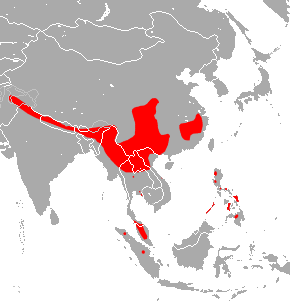Big-eared horseshoe bat facts for kids
Quick facts for kids Big-eared horseshoe bat |
|
|---|---|
| Conservation status | |
| Scientific classification | |
| Genus: |
Rhinolophus
|
| Species: |
macrotis
|
 |
|
| Where the big-eared horseshoe bat lives | |
The big-eared horseshoe bat (Rhinolophus macrotis) is a type of bat found in Asia. It belongs to a family of bats called Rhinolophidae, which are known for their special nose shapes.
Contents
What is a Big-Eared Horseshoe Bat?
How it Got its Name
The big-eared horseshoe bat was first described as a new species in 1844 by an English zoologist named Edward Blyth. The first bat of this kind was found in Nepal. Its scientific name, macrotis, comes from two ancient Greek words: makrós, meaning "long," and oûs, meaning "ear." This name perfectly describes one of its most noticeable features!
Different Types of Big-Eared Bats
Just like there are different breeds of dogs, there are often different types of animals within a species. These are called subspecies. The big-eared horseshoe bat has several subspecies, which are slightly different versions found in various parts of its range.
What Does it Look Like?
You can easily tell the big-eared horseshoe bat apart from other horseshoe bats because of its very long ears. It also has a unique nose structure, called a sella, which is shaped like a tongue and is quite long and wide. This special nose helps them use echolocation to find their way around and hunt insects in the dark.
Where Do Big-Eared Horseshoe Bats Live?
Their Home Countries
The big-eared horseshoe bat lives in many countries across South and Southeast Asia. You can find them in places like Bangladesh, China, India, Indonesia, Laos, Malaysia, Myanmar, Nepal, Pakistan, Philippines, Thailand, and Vietnam. It's also possible they live in Bhutan, but scientists haven't fully confirmed it yet.
Their Favorite Places to Hang Out
These bats live in different kinds of places, from lowlands to higher areas. They have been found living at various heights, from about 200 meters (about 656 feet) to 1,692 meters (about 5,551 feet) above sea level. They often live in caves, which provide safe and dark places for them to rest during the day.


